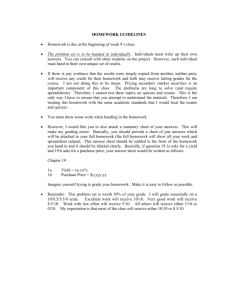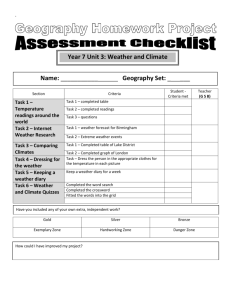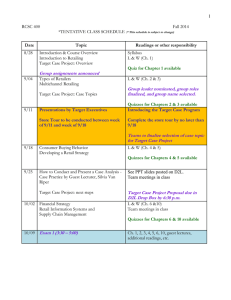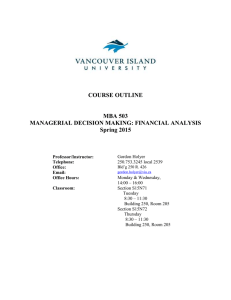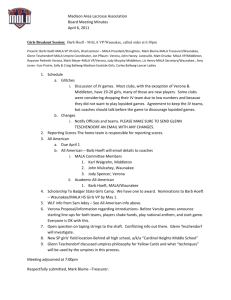course outline
advertisement
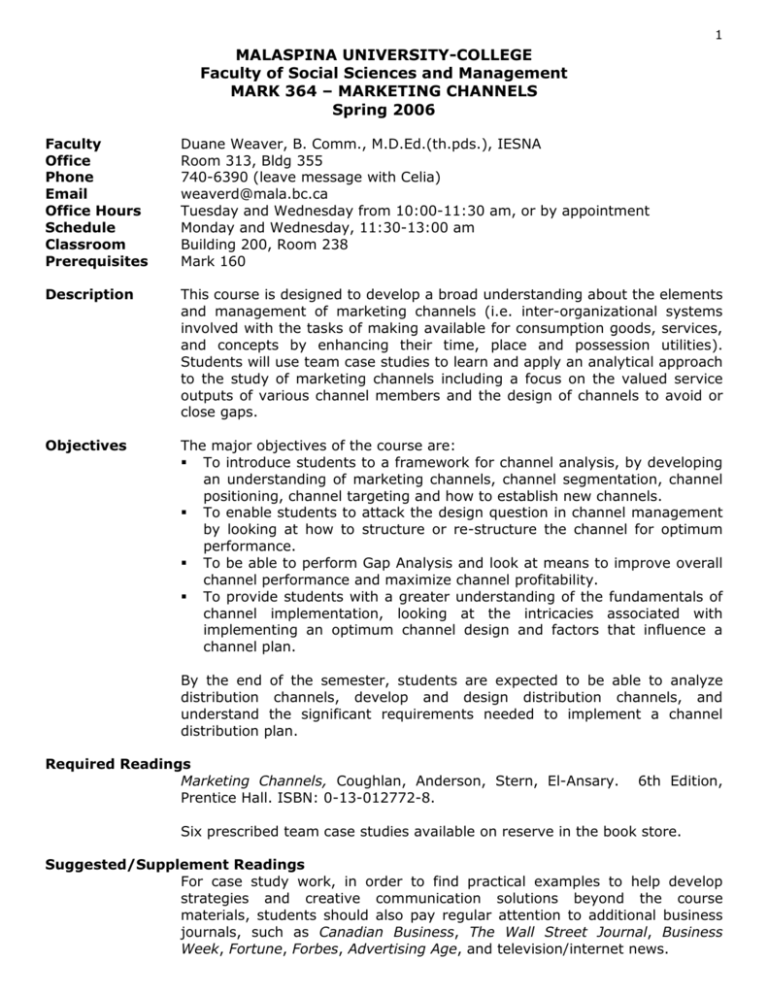
1 MALASPINA UNIVERSITY-COLLEGE Faculty of Social Sciences and Management MARK 364 – MARKETING CHANNELS Spring 2006 Faculty Office Phone Email Office Hours Schedule Classroom Prerequisites Duane Weaver, B. Comm., M.D.Ed.(th.pds.), IESNA Room 313, Bldg 355 740-6390 (leave message with Celia) weaverd@mala.bc.ca Tuesday and Wednesday from 10:00-11:30 am, or by appointment Monday and Wednesday, 11:30-13:00 am Building 200, Room 238 Mark 160 Description This course is designed to develop a broad understanding about the elements and management of marketing channels (i.e. inter-organizational systems involved with the tasks of making available for consumption goods, services, and concepts by enhancing their time, place and possession utilities). Students will use team case studies to learn and apply an analytical approach to the study of marketing channels including a focus on the valued service outputs of various channel members and the design of channels to avoid or close gaps. Objectives The major objectives of the course are: To introduce students to a framework for channel analysis, by developing an understanding of marketing channels, channel segmentation, channel positioning, channel targeting and how to establish new channels. To enable students to attack the design question in channel management by looking at how to structure or re-structure the channel for optimum performance. To be able to perform Gap Analysis and look at means to improve overall channel performance and maximize channel profitability. To provide students with a greater understanding of the fundamentals of channel implementation, looking at the intricacies associated with implementing an optimum channel design and factors that influence a channel plan. By the end of the semester, students are expected to be able to analyze distribution channels, develop and design distribution channels, and understand the significant requirements needed to implement a channel distribution plan. Required Readings Marketing Channels, Coughlan, Anderson, Stern, El-Ansary. Prentice Hall. ISBN: 0-13-012772-8. 6th Edition, Six prescribed team case studies available on reserve in the book store. Suggested/Supplement Readings For case study work, in order to find practical examples to help develop strategies and creative communication solutions beyond the course materials, students should also pay regular attention to additional business journals, such as Canadian Business, The Wall Street Journal, Business Week, Fortune, Forbes, Advertising Age, and television/internet news. 2 Academic Misconduct Academic misconduct will not be tolerated. Academic misconduct includes, but is not limited to, giving or receiving information during any test or exam, using unauthorized sources of information during any test or exam and plagiarizing the work of another person. More details on this are set out in the Student Conduct Policy on pages 34 and 35 of Malaspina University College’s 2005-2007 calendar, or online: http://www.mala.ca/policies/policy.asp?rdPolicyNumber=99.01 http://www.mala.ca/policies/policy.asp?rdPolicyNumber=32.05 No electronic dictionaries or cell phones will be allowed in exams/tests/ quizzes. Only the following approved calculators may be used in exams/ tests/quizzes. Texas Instrument BAII Plus, BAII, BA35 Sharp EL-733A Hewlett Packard 10B No other materials will be allowed on the desktop apart from a pen/pencil unless specifically approved by the faculty member. Referencing Faculty in Business require the Harvard style of referencing for academic papers. Please see Quote, Unquote Referencing, at http://web.mala.bc.ca/management/ Exam Accommodation Students with documented disabilities requiring academic and or exam accommodation should contact Disability Services, Room 308, Building 200, or call 740-6416. Grading Scale Evaluation Grades will A+ 93 – A 86 – A80 – B+ 77 – B 73 – B70 – be assigned according to the following scale. 100% C+ 67 - 69 92 C 63 - 66 85 C60 – 62 79 D 50 - 59 76 F < 50 72 Assignment Examinations: First exam Second exam Case Analysis (Teams) Case Analysis (Self) Quizzes Total Weight Date Due 20% 20% 20% 30% 10% 100% February 15, 2006 April 13-26, 2006 To be assigned during class March 22, 2006 at 11:30 a.m. Periodic “pop quizzes” Note: To pass the subject with satisfaction, students must complete all of the above assignments. Late submission of assigned work will be deducted 10% per day late to a maximum of 3 days. Thereafter, a grade of 0% will be applied. Plan ahead to mitigate MURPHY’s LAW. Examinations Two examinations, one for each half of the term, will be given. The exams will cover class lectures, cases, discussions and the assigned readings. They are NOT comprehensive. The format for these exams will be multiple-choice questions with some written discussion questions. 3 Case Analysis This course will use a case-based learning model whereby text lectures will be followed up with a team presentation. One team will prepare and present the case as well as hand in a case report. The other teams are expected to also prepare by meeting to review the case so as to be able to engage the presenting team in a discussion about the case. You will also be evaluated for your engagement in case discussions. Emphasis will be on discussion of the issues learned in the associated chapter as it relates to the case being discussed. The presenting team will be assessed on their presentation and their submitted case report. TEAM CASES (20%): Students will work in team groups of 5 or 6 to prepare and review weekly cases. One of the teams will be responsible for presenting the case for discussion with the class. All members of the team will receive the same mark for the case. Teams should expect to prepare and present 2-3 cases each during the course term. All students are expected to have read the related readings and reviewed the case prior to class. (10% of the case grade will be for the presentation and 90% will be for the case report to be submitted (in hard copy) one week after it is presented). INDIVIDUAL CASE REPORT (30%): Each student will be asked to prepare one case on their own to be submitted in hard copy format (Due date: 11:30 a.m. March 22, 2006). The case will be assigned during the 3rd week of classes. It is expected that students will develop a new or restructured channel distribution plan as it relates to the case. This requires a thorough understanding of the materials within the course. Students are expected to provide detailed referencing of extensive research conducted and application of individual and creative thought to the final case report. Participation/Quizzes Students are expected to ask questions on the lectures and assigned readings, as well as to participate in class discussion, which will enhance the quality of the classroom experience. Pop quizzes will be given occasionally to make sure that the material covered is being understood. 4 Class Outline and Reading Assignments Date Week 1: January 4 Week 2: January 9 January 11 Week 3: January 16 January 18 Week 4: January 23 January 25 Week 5: January 30 February 1 Week 6: February 6 February 8 Week 7: February 13 February 15 STUDY WEEK: February 20 February 22 Week 8: February 27 March 1 Week 9: March 6 March 8 Week 10: March 13 March 15 Week 11: March 20 March 22 Week 12: March 27 March 29 Week 13: April 3 April 5 Week 14: April 10 April 13-26 Topic and Activity Assignment Due Course Introduction, Objectives Marketing Channels: Structure and Function (1) Chapter 1 Marketing Channels: Structure and Function (2) Channel Power (1) Chapter 1 Chapter 8 Channel Power (2), Case Analysis Channel Design and Implementation Chapter 8, Case 1 Chapter 2 Segmentation: Service Output Supply Side Channel Analysis (1) Chapter 3 Chapters 4,5 Supply Side Channel Analysis (2) Case Analysis, Gap Analysis (1) Chapters 4,5 Cases 2, 3, Chapter 7 Gap Analysis (2) Vertical Integration Chapter 7 Chapter 7 Managing Conflict First Examination (Chapters 1-9 and Cases) Chapter 9 Study Break Study Break (No classes) (No classes) Channel Implementation Issues Strategic Alliances Chapter 10 Chapter 11 Legal Constraints, Case Analysis Retailing (1) Chapter 12, Case 4 Chapter 13 Retailing (2) Nonstore Retailing and Electronic Channels Self-Study (Case development) Case Analysis, Wholesaling (1) Chapter 13 Chapter 14 Self-Case Case 5, Chapter 15 Wholesaling (2) Logistics and Supply Chain Management Case Analysis Chapter 15 Chapter 16 Case Analysis Franchising Case 6 Chapter 17 Review Chapters 11, 12, 13, 14, 15, 16 and 17 Second Examination (NOT comprehensive)



